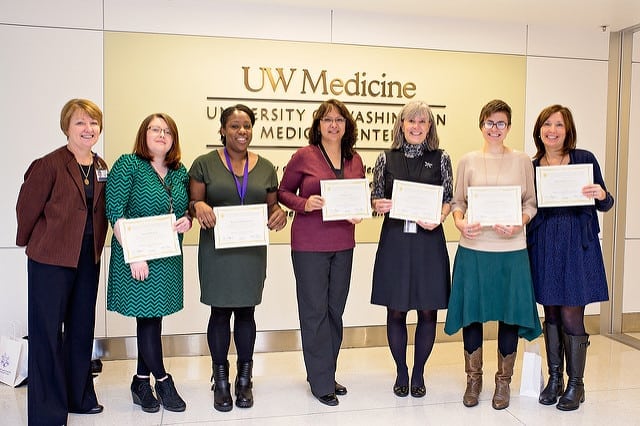
Train the trainer program empowering clinic teams sees significant improvements in outcomes
The UW School of Pharmacy is proud to celebrate Associate Dean Peggy Odegard, PharmD, CDE’s, recognition with the Golden Eddy Award as part of a Diabetes Education team of outstanding patient educators awarded in Fall 2015. UW Medicine Patient and Family Education Services’ Golden Eddy awards are presented annually to Outstanding Patient and Family Educators. The award recognizes a truly unique patient education collaboration in the UW Health Care System –using specialized expertise and cross-training to increase access to patient-centered, specialized care and education in local communities.
UW Neighborhood Clinics and the UW Medicine Endocrine and Diabetes Care Center (DCC) have provided diabetes education to patients in select primary care clinics. A novel “train the trainer” program was developed by UW Medicine DCC colleagues Alison Evert, MS, RD, CDE and Associate Dean Peggy Odegard, PharmD, CDE along with Maureen Chomko, RD, CDE, primary care dietitian, to empower clinic staff to act in the role of patient educators. The award also honors the outstanding effect this program has demonstrated in improving participant diabetes health. The clinic-based staff teams who provide this impactful diabetes education to patients comprises an interprofessional group including registered dietitians, registered nurses, and social workers with Evert, Odegard and Chomko providing ongoing mentoring to staff to promote continued knowledge and skill development.
During the pilot, the process and impact of the classes offered in the clinics was studied with an eye to testing the ability to translate the DCC diabetes education program, taught by certified diabetes educators, into community-based learning for patients. The pilot had three primary goals: increase access to diabetes management education, and reduction in participant weight and A1c levels (a key measurement of blood sugar).
The results across all measurements are proof positive of the program’s benefits. The program has substantially enhanced access to diabetes education and has done so locally for patients in their own communities. This is evidenced by patient enrollments in these educational classes regularly filled at the primary care clinics and participation increased as compared to usual enrollments in similar classes at the Seattle-based academic medical center. Diabetes health is also significantly improved in two key ways for program participants with reduction in A1c levels by 1.1% over three months and loss in weight, on average, of slightly over one pound per month over three months. Notably, this significant progress made at three months was sustained at six months for participants.
As part of this effort, the UW Neighborhood Clinic program sites also met the requirements to receive accreditation by the American Diabetes Association (ADA), which permits the classes to be covered by Medicare and Medicaid, further increasing patient participation. Results of the project were presented at the ADA meeting in June, and the team is finalizing a manuscript for submission this Fall in primary care.
“This project shows the benefits of integrating educational, clinical, and research expertise to help develop impactful practice-based interventions,” underscored Odegard. “We had a terrific team to work with and look forward to continuing to increase the number of trainers educated and further improving the delivery of diabetes care throughout UW Medicine primary care.”